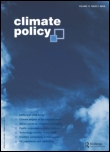External publications

Climate impact auctions: an underused tool for green subsidies in the Global South
Matthey, Max Alexander / Aidan Hollis / Clara Brandi / Georg Kobiela / Benjamin Roth / Magdalene SilberbergerExternal Publications (2025)
in: Climate Policy, first published 15.02.2025
DOI: https://doi.org/10.1080/14693062.2024.2411319
Open access
The urgency of reducing emissions globally requires the participation of Low- and Middle-Income Countries, which represent over 70% of global emissions. Funding from High-Income Countries’ support for a ‘just transition’ in developing countries through institutions such as the Green Climate Fund has almost exclusively been given as investment-cost subsidies. In contrast, the same industrialized countries extensively use performance-based mechanisms to drive emissions reductions domestically. We explore the advantages and disadvantages of using results-based subsidies allocated through reverse auctions as a tool to support mitigation in Low- and Middle-Income Countries. Results-based subsidies would drive strong responses by giving greater rewards for better performance. By reducing administrative discretion, results-based subsidies would decrease costs and facilitate participation by small- and medium-sized firms. Results-based subsidies would, however, increase capital costs and would reallocate risks from donors to project proponents. Overall, they could be attractive in specific circumstances, specifically for projects that can be competitive, have measurable results, and currently face socially suboptimal investment. Key policy insights:
- Low- and middle-income countries collectively are responsible for over 70% of global emissions but lack the policies and financial capacity to transition to a low-carbon future.
- While industrialized countries use results-based payments domestically, their subsidies for emissions reduction and carbon removal in developing countries fund investment rather than reward results.
- Competitive, results-based subsidies could complement existing funding streams, increase efficiency, and open access to subsidies to small- and medium-sized firms.
Contact
Cornelia Hornschild
Publication Coordinator
E-mail Cornelia.Hornschild@idos-research.de
Phone +49 (0)228 94927-135
Fax +49 (0)228 94927-130
Alexandra Fante
Librarian/ Open Access Coordinator
E-Mail Alexandra.Fante@idos-research.de
Telefon +49 (0)228 94927-321
Fax +49 (0)228 94927-130



![[Translate to English:] Photo: Alexandra Fante, Bibliothekarin/Open Access-Koordinatorin](/fileadmin/_processed_/f/0/csm__c_Deutsches-Institut-fuer-Entwicklungspolitik_Fante_94ce4fa1ba.jpg)